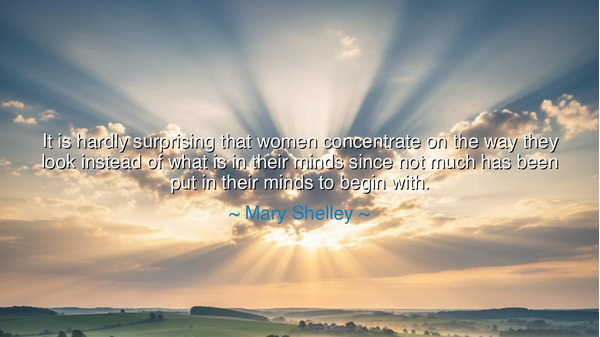
It is hardly surprising that women concentrate on the way they
It is hardly surprising that women concentrate on the way they look instead of what is in their minds since not much has been put in their minds to begin with.






The words of Mary Shelley burn with both sorrow and defiance: “It is hardly surprising that women concentrate on the way they look instead of what is in their minds, since not much has been put in their minds to begin with.” Here she unveils a bitter truth of her age—that society adorned women with mirrors, but denied them books; that it praised their beauty, but neglected their minds. In such a world, it was not nature but culture that shaped them, confining their talents to surface and appearance while starving their intellect.
Shelley herself was a daughter of two fierce spirits—Mary Wollstonecraft, author of A Vindication of the Rights of Woman, and William Godwin, philosopher and reformer. From her mother she inherited the fire that saw clearly the injustice done to women: denied education, they were trained to value their faces more than their thoughts, their grace more than their genius. Shelley’s words are not condemnation of women, but condemnation of a world that offered them little nourishment for the soul, then mocked them for seeking sustenance in vanity.
History bears witness to this cycle. In the salons of eighteenth-century Europe, women of wit and brilliance existed, but their voices were often treated as ornament, their intellect tolerated only if it charmed. Meanwhile, young girls were raised not to reason but to please, told that their worth lay in securing a husband rather than in cultivating their own minds. Thus, when they turned to their appearance, it was because their society had robbed them of richer soil to grow in.
Yet even in this barren ground, great spirits arose. Mary Shelley herself, though barely eighteen, gave to the world Frankenstein, a tale not of idle beauty but of profound philosophy, exploring creation, ambition, and the nature of man. She proved by her own life that when women are given the chance, their minds yield treasures as deep and vast as any man’s. Her words remind us that the failure was not in the women, but in the world that starved their intellect.
So let the future remember: do not blame those who look to the mirror when the book was denied them. Instead, open the gates of learning wide, and let women’s minds be nourished with wisdom, with art, with science. For when the mind is filled, the heart is strengthened, and society itself is exalted. To confine half of humanity to vanity is to rob the whole of its greatness; but to set them free is to double the light of the world.






Y2Nhu Y 24.
Mary Shelley’s statement about women’s focus on appearance raises a valid point about how historical inequalities shaped women’s lives. If women were not given the same opportunities for intellectual growth, it makes sense that they would focus on what society valued most—appearance. But I also wonder, how much of this thinking is still ingrained today, and how can we foster a world where women are encouraged to embrace both their intellect and their physical selves without conflict?
DHPhan Duy Hoang
This quote from Mary Shelley seems harsh, but it highlights the inequality that existed in her time and still exists in many ways today. Women have long been seen as objects of beauty, rather than minds capable of deep thought. I wonder, how much progress have we really made in changing that narrative? Are women now given the opportunity to be recognized for their intellect, or are beauty standards still placing limitations on their potential?
HDHuong Dau
While Mary Shelley’s quote is a powerful criticism of how women have been historically limited in their intellectual development, it also seems to point to a more systemic issue. How much of women’s emphasis on appearance is driven by societal standards, and how much of it is a reflection of the real obstacles they face in the pursuit of knowledge? Do we still see this play out in modern society, where women are often forced to choose between appearance and intellect?
MNThanh Mai Nguyen
Mary Shelley’s quote brings to light the historical and ongoing problem of gender inequality in education and intellectual freedom. It’s a commentary on how women were and sometimes still are, judged by their appearance rather than their intellect. But, can we say that today, women have equal opportunities for education and self-expression? Or are we still battling ingrained stereotypes that place a woman’s worth primarily on how she looks rather than what she knows?
NTvu ngoc ti
Shelley’s words highlight how societal expectations have shaped the way women value themselves. The idea that women focus on their appearance because they haven't been given the tools to develop their minds is deeply problematic. But could this idea also reflect the pressures placed on women to conform to a specific image? Are women in the modern world still battling these limitations, or are we starting to shift toward a more empowering approach to women’s identity?